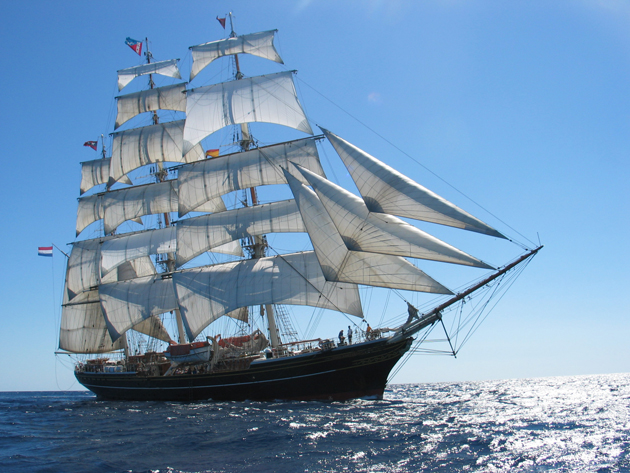Hope is not simply a virtue or bonus of life, but it is an essential anthropological given – a primary human emotion that is often overlooked in research.
 Clipper Stad Amsterdam.
Clipper Stad Amsterdam.
In a secular Europe where faith is locked into the boxes of private preferences finding an in-depth conversation between philosophers, theologians, CEOs, politicians and economists about happiness and wellbeing is unheard of.
Yet this occurs at a special, yearly event in the Netherlands, when about fifty such people meet for an event entitled ERGO (which stands for: Economics, Religion, Governance & Organization). They spend two days on a gorgeous ship, a three-masted clipper, to openly discuss some of the most complex challenges facing Western European societies. Admittedly, the nautical ambiance and collegial atmosphere contribute to the success of these meetings!
On September 7-8, they assembled to discuss: ‘love and happiness come together’. The discussions were intense, personal and sophisticated. A hedge fund manager, for instance, shared how getting acquainted with virtue ethics changed the discussions he has in the board meetings of a bank. This goes to show that this group of highly influential men and women are aware of the fact that ethics are not a luxury window dressing, but must be integrated in the heart of our economic enterprises. They acknowledge that an increase in welfare doesn’t automatically result in an increase in happiness. Not all participants are believers; some make a case for social behaviorism, purely based on science. Others are devoted Christians – Catholics or Protestants. What they have in common is an awareness that our economic context is profoundly changing, resulting in the need to connect a deeper understanding of the human person with economic growth and sustainable development. This is where humanities, theology and (political) economy interact with each other, with the increasing understanding that economics is primarily about reciprocal relationships, cooperation and trust, and only secondarily about capital, goods, labor and money.
Most of the time during the meeting, a combined paper was presented by a philosopher/theologian and an economist. Added to this were reflections from practitioners in the field, for instance a CEO of a bank, an industrialist, etc. In this setting, I had the opportunity to talk about the Judeo-Christian meaning of hope and its importance for an economy of development. Hope is not simply a virtue or bonus of life, but it is an essential anthropological given – a primary human emotion that is often overlooked in research. Hope is a way of looking at facts and it is a part of us being travelers in life (homo viator), a Christian metaphor that resonates well, especially when sailing together on a ship! Hope is the oil greasing the machine. As the philosopher John Stuart Mill stated: “A hopeful disposition gives a spur to the faculties and keeps all the working energies in good working order.” The concept of ‘hope’ requires more attention in our economic models as one of the essential human capabilities that needs to be developed. Yet hope is often misunderstood as utopic or reduced to egoistic individualism often veiled with false religion. A sound and critical understanding of hope contributes to growth and wellbeing. My colleague Martijn Burger from the Erasmus University Rotterdam, involved in the Erasmus Happiness Economics Research Organization, discussed the distinction between aspirational hope and wishful hope. He also shared some results of his recent field research among students in Greece during the turmoil with the European Union. Indeed, hope seems to matter as do love and relationships.
The challenge that remains is how to define and measure hope. The capability approach, developed by, among others, the Nobel Prize-winning economist Amartya Sen and the philosopher Martha Nussbaum, seems to have potential. Maybe we need to think more in terms of development economy and leave the dogmas of neoliberalism behind us? Truly, this yearly ERGO meeting in the Netherlands is a little sign of hope, a poem crossing the pages of dry econometrics.
Patrick Nullens (Ph.D.) is Professor of Systematic Theology and Ethics, as well as Rector of the Evangelische Theologische Faculteit, Leuven (Belgium), and director of the Institute of Leadership and Ethics.
This blog is part of a blog series on Leadership & Social Ethics, published by the Institute of Leadership and Ethics. For more information, please visit their website.

Las opiniones vertidas por nuestros colaboradores se realizan a nivel personal, pudiendo coincidir o no con la postura de la dirección de Protestante Digital.
Si quieres comentar o